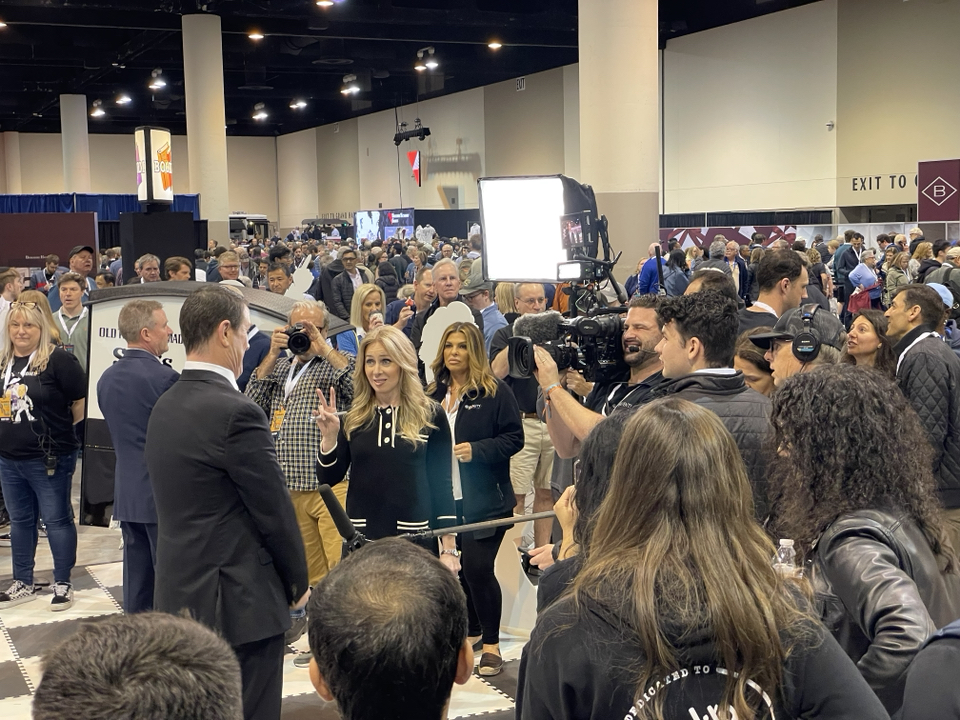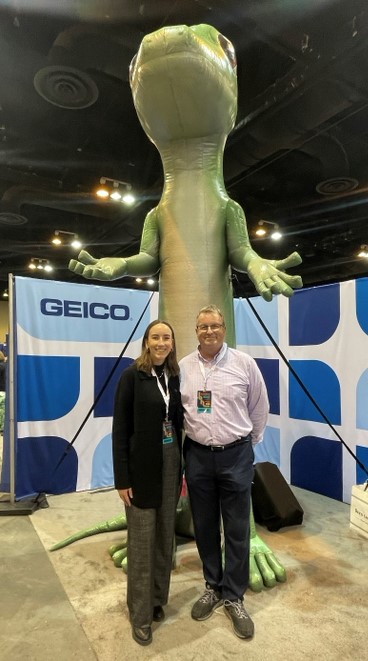On Saturday May 6th, I had the pleasure of attending the 2023 Berkshire Hathaway Annual Shareholder meeting in Omaha, Nebraska. It is one of my favourite times of the year and is something I always look forward to. It was an action-packed weekend complete with visiting Nebraska Furniture Mart, having dinner at Warren’s favourite steak house, eating some See’s Candies, and taking a look at the shiny display cases in Borsheims. The highlight of the weekend and the cause of the trip was of course getting to sit in a room with my heroes, Warren Buffett and Charlie Munger, and listening to their wise words of wisdom. Having the opportunity to attend the annual meetings is such an invaluable and profound experience that I will forever cherish.
The meeting started off with the annual movie that the staff of Berkshire Hathaway write and produce. This year, the movie had a montage of recordings of previous meetings starting in 1994 where Warren, now age 92, was asked about Berkshire’s succession plans and what will happen when he passes. For all the countless times Warren has been asked, the answer has remained the same: Berkshire Hathaway will do just fine. It is extremely hard for me to imagine Berkshire Hathaway or even the world without Warren and Charlie however, neither Warren nor Charlie are concerned and they have a plan.
They have built an incredibly strong and robust company that has a huge cash flow, sufficient diversification, and doesn’t have large amounts of debt. Warren and Charlie believe they are handing a very secure entity over. Greg Abel has been appointed as Warren’s successor and will take over as CEO where he will be responsible for the non-insurance aspect of Berkshire Hathaway. Ajit Jain will oversee the insurance sector of the company. Warren also has immense confidence in Berkshire’s managers and believes they are a large reason why Berkshire does better than other conglomerates.
The movie also included advertisements for a variety of companies owned by Berkshire Hathaway as well as a few skits featuring Hollywood’s renowned actors: Warren Buffett, Charlie Munger, and Jamie Lee Curtis. One of the satirical skits began with Warren debating whether he should invest in “internet stocks” however, Charlie was not too fond of the idea. Jamie Lee Curtis who was lounging in bed received a phone call from Warren to which she answered by saying: “Warren ‘All-You-Can-Eat’ Buffet?” Warren proceeds to ask her to convince Charlie to invest in internet stocks using her charm. Jamie Lee Curtis follows through with her agreement by calling Charlie and by using a seductive voice, she is able to persuade him to get on board with the idea.
It is very clear Warren Buffett and Charlie Munger love doing what they do. They have a lot of fun.

Preliminary
Following the movie, Warren was quick to jump right into the meeting by giving a brief summary of Berkshire Hathaway’s financial standing in 2022 and shared his outlook on what he believes 2023 will bring. Warren expects things to be slower this year however, he prefaced his thoughts by saying: “When I say expect, nothing is sure. Nothing is sure tomorrow; nothing is sure next year. Nothing is ever sure in markets or business forecasts. We don’t pay attention to markets.”
Warren has always preached to focus more on the cash flow off your investments (i.e., dividend income) and the quality of the companies you have invested in rather than be fixated on the fluctuating market value of the portfolio.
Warren acknowledges that the majority of Berkshire’s businesses will report lower earnings this year than last. The climate is different now than it was six months ago. Goods that were ordered previously are being delivered now during a time where people have a different mindset. As a result, there will be sales on goods where there were no sales before.
The investment income of Berkshire Hathaway will be a lot larger this year than last year. The same money that was getting 0.40% is now getting 5.92% bond equivalent yield. What was producing $50 million a year is now producing $5 billion a year.
A very important aspect of Berkshire Hathaway is the insurance sector. Warren noted that on a probability basis, Berkshire is likely to have a better year in insurance underwriting than in 2022 since it is not affected by the business cycle. What can have an impact on his prediction is a natural disaster.
The insurance business provides Berkshire Hathaway with a float. The float is a sum of money that is funded by the insurance premiums paid by those who have purchased insurance. The float is invested until insurance claims are made. This substantial float finances the equity portion of Berkshire Hathaway and this provides the company with a lot of opportunity that sets them apart. Warren drew a parallel between the float and a bank deposit. Having a float is similar to having a bank with no employees, no interest, and no ability to withdraw money in a hurry that they have working for them. The high net worth gives Berkshire so much discretion that no other company enjoys.
Warren noted that Berkshire Hathaway has the most equity than any other company in the United States. This is not because it is the most valuable company but because Berkshire retains earnings instead of paying dividends and buying back shares at an unreasonable price. Berkshire doesn’t pay dividends because the company can better deploy the funds by further investing in businesses. This adds equity and value to the shareholders’ holdings of Berkshire. If the earnings are being retained, then the earnings should increase over time and hopefully at a reasonable rate. Warren noted that Berkshire paid a 10 cent per share dividend once in 1967, which he claims was a ‘terrible mistake.’ He joked that he had left for the men’s room as the directors made the decision. Warren has admitted to making mistakes however, the key to his success is he uses his mistakes as learning opportunities, which reduces the possibility of making the same mistake again.
The remainder of the meeting was a six hour Q&A session where members from the audience and Becky Quick on behalf of the shareholders asked Warren Buffett, Charlie Munger, Greg Abel, and Ajit Jain a variety of questions. It is incredibly difficult to summarize everything that was covered however, I have highlighted a few key topics below. Please feel free to jump to the topics that are of most interest to you:
- Robotics and Artificial Intelligence
- Railroads
- Strength of the United States
- U.S. Banking Industry
- Environmental Concerns
- General Investment and Life Lessons from Warren & Charlie

Robotics & Artificial Intelligence
With the recent advancements in technology and a greater focus on artificial intelligence (AI) and robotics, there are many unknowns regarding what impact it will have on society. Warren and Charlie were asked a few questions by the audience on what their perspectives and thoughts are on this subject. Charlie acknowledged how robotics are being used at an unbelievable rate at the BYD’s factories in China. He knows that more robotics & AI will be used in the future however, he is a bit skeptical around the hype because he believes “old fashioned intelligence” works pretty well.
Warren commented how AI won’t be able to replace someone like Ajit or tell jokes however, he is aware it is capable of a lot of things. When something has the capability of doing all kinds of things, he gets worried because it is something we can’t undo or uninvent. Warren suggested the atomic bomb as an example. We needed the advancement at the time of its invention however, he wonders if it is great to have access to it for the next 200 years. Ultimately, AI can change everything except for how humans think and behave.
When it comes to investing in this new environment with disruptive technologies, Warren argues that tech won’t change much. He believes that new things don’t take away opportunities and instead, “what provides us with opportunities is other people doing dumb things.” Charlie believes there will be greater competition and it will be more of a challenge to seek unique opportunities. He says there are large sums of money in the hands of many smart people all trying to out smart one another. Warren added that people are trying to outsmart one another is areas that don’t need to be played in. Investors are tremendously focused on the short term and additionally, there are investor calls trying to feed into people’s expectations that in the end will only be slightly beaten. This certainly does not need to be the case.
 There was a question asked specifically about what Geico, Berkshire’s auto insurance company, was doing to mitigate the threat of the competitive challenge of telematics. Ajit began answering the question by stating how they are experiencing a bottleneck of technology. Geico has more than 600 legacy systems that don’t talk to each other and they are trying to compress them to no more than 15 or 16 systems that are able to work congruently. Geico has a long way to go however, they are making strides with efforts to advance their technological capabilities. Warren added that there are a lot of companies that use tech therefore, those companies are indeed tech companies as well. Needless to say, even though a company may not be categorized in the technology sector, their technological capabilities can still be an integral part of their business that contributes to their success in providing products and services.
There was a question asked specifically about what Geico, Berkshire’s auto insurance company, was doing to mitigate the threat of the competitive challenge of telematics. Ajit began answering the question by stating how they are experiencing a bottleneck of technology. Geico has more than 600 legacy systems that don’t talk to each other and they are trying to compress them to no more than 15 or 16 systems that are able to work congruently. Geico has a long way to go however, they are making strides with efforts to advance their technological capabilities. Warren added that there are a lot of companies that use tech therefore, those companies are indeed tech companies as well. Needless to say, even though a company may not be categorized in the technology sector, their technological capabilities can still be an integral part of their business that contributes to their success in providing products and services.
BNSF Railway is one of Berkshire Hathaway’s top holdings that accounts for a large portion of Berkshire’s value. The railway is an extremely important asset to both Berkshire and America as it provides a means of transportation of essential and consumer goods. As Warren stated in his 2021 Chairman’s letter, if the products BNSF carries were instead hauled by a truck, America’s carbon emissions would soar. Railways are a great method of transporting goods however, like many things, there are areas of improvement.
One of the questions asked by an audience member pertained to the train derailment where BNSF violated their agreement on Indigenous lands and spilled crude oil. They wanted to know what Warren is doing to ensure BNSF is fulfilling their ethical responsibilities.
Greg addressed the issue by admitting they had made a mistake and violated the agreement by transporting more cars per day across the land than permitted. They have taken this issue very seriously and would like to make amends and continue to have meaningful conversations regarding the issue. Greg was sure to acknowledge the benefits gained by BNSF and the number of lessons to be learned from it. They made an agreement, and they should stick to it and respect it.

In regard to the train derailment resulting in the spill of crude oil, there has luckily been no long term environmental impacts and the BNSF response team was effectively able to clean up the spill. Warren brought awareness by stating there are over 1000 derailments annually in the railroad industry, a number I was quite surprised by. BNSF is constantly looking how to mitigate derailments and improve their processes in the event of it occurring. Railroading is no easy task as it involves carrying all types of goods in a wide range of conditions and terrain. BNSF is a common carrier who will carry goods if a company chooses to use their services however, sometimes the type of goods albeit essential are not ideal to transport and may pose risks.
Another question was asked regarding Precision Scheduled Railroading, a method that is being adopted by many railroad companies. This method streamlines the process by using departure schedules and a point-to-point delivery method where railroad companies establish a central point with multiple companies to pick up and deliver their goods at one time. BNSF has chosen a different route by not adopting this process and instead catering to their customers by individually arranging a pickup time and location that provides their customer with the utmost convenience. Greg claimed that BNSF balances efficiency with the needs of their customers. The company has made great progress in efficiency and maintained the safety of their employees.
In a time where there's a lot of uncertainty, Warren assures there is a lot of hope and reasons to be optimistic. The United States has undergone a lot of trials and tribulations despite it being a relatively young country that was only established less than 250 years ago. Warren stated: “Charlie and I combined, we have lived two thirds of the life of the country.” What the country has achieved and overcome since it’s inception is incredible.
Warren believes that net America is a better place to live today than when he was born in many ways. The United States had one half of 1% of the world’s population in 1790 and now the country has over 25% of the world’s GDP. There have been many improvements however, to maintain the benefits of the United States, it is important to call out and acknowledge the downfalls. Present day communications have helped us see problems more clearly and has brought awareness to the terrible ongoings in the world today. It is important not to assume that something magical will happen and all the problems will just disappear on their own. Warren stated that he doesn’t know the solution however, we need to think of different ways to get important problems solved.
Warren identified a problem that is occurring within our society today. That problem lies within partisanship moving towards tribalism. Warren feels strongly that tribalism doesn’t work well because when it gets to tribalism, you don’t listen to the other side and it can lead to mobs. Warren stated that as society evolves, we must refine our democracy and ensure we are all striving to achieve a unified goal of making our world a better place. The future of the world is incredibly exciting but it is also daunting with many of its challenges.
“It doesn’t look very promising but I am sure when Lincoln looked out at the civil war, it didn’t look very promising either. I think the US is very capable of doing incredible things and they are capable of doing it again.” – Warren Buffett

Given the recent failure of Silicon Valley Bank (SVB), there were multiple questions regarding the U.S. banking system. Warren acknowledged that if the losses of SVB were not fully covered, it would have had catastrophic economic consequences on the nation due to the fear it would instill in investors, and this is the sole reason why the federal government stepped in.
As Warren stated: “Fear is always contagious and historically fear was sometimes justified.” Shortly after WWI, approximately 2000 banks failed. Bank runs were a norm during that time period. The Federal Deposit Insurance Corporation (FDIC) was established as a result which Warren emphasized was enormously sensible. The FDIC insures deposits that are made in American commercial banks and savings banks. If people are concerned whether their money is safe at the bank, it is hard to run an economy very well and investors would be less compelled to participate in the market. The FDIC provides some assurance and peace of mind.
In 2023, we witnessed the FDIC take action by paying out funds to cover everyone’s deposits that were affected by the collapse of the SVB. Despite the outcome, there are still many individuals who are worried and confused which Warren claims is largely due to the poor messaging by the press, agencies, and politicians. The FDIC has no interest in having a bank fail and to have deposits lost however, the mixed and unclear messaging leads to individuals being wary and concerned.
Berkshire Hathaway keeps a lot of cash available and holds T-bills because Warren wants to be there in the event the banking system gets stalled. He doesn’t think it will or should happen however, it could. Warren highlights that the incentives behind US bank regulations are messed up and people are interested in having them messed up. In the present day, you can have a bank run in seconds because you can take money out with a press of a button instead of driving to your nearest bank and standing in a line. Warren emphasized that the directors have the ability to hold the CEO accountable and the stockholders of the future shouldn’t be the ones who suffer. Warren says it isn’t a complicated problem, we have just screwed up the answer and we have screwed up the communication of it.
Warren mentioned that if banks follow sound banking methods, it can be a perfectly decent investment. Warren had bought a bank in 1969 at Berkshire and had $19 million invested in it. If the banking holding company act of 1970 hadn’t have been passed, he would have bought a lot more banks however, they had to divest from that bank over 10 years. In terms of owning US banks, Warren says events will determine their future. Every event starts recreating a different story.
Charlie’s blunt take on this topic is that US banking has changed greatly over the course of his lifetime and the gamier it gets, the less he likes it. Charlie is distrusting in situations where everyone wants to get rich and envies everyone else. He regards this atmosphere as ‘utterly toxic.’ Charlie feels investment bankers should focus more on avoiding trouble than trying to get rich through ways such as derivative trading. He believes it isn’t a great social outcome for the rest of us. Warren added that banking can have new inventions but it needs to maintain some old inventions as well. If you take the risk and lose money by borrowing on 100% margin, it's simply too bad. As Warren stated: “You have to have penalties hit the people that cause the problems, if you are going to change how people behave in the future.”

A recurring question that has been asked over the years as the world experiences environmental hardships is: What is Berkshire Hathaway doing to address these major issues? In accordance with the Paris agreement, Berkshire Hathaway is well on their way to having their carbon footprint reduced by 50% by 2030 relative to 2005.
Warren identified that the United States should be ahead of where they are however, when it comes to crossing state lines it’s not easy because there is no clear energy plan across the country. The issues are approached state by state rather than as a unified nation. Greg emphasized that it’s not possible to just wake up one day and have a different source of energy. You have to build the resources and cohesively implement it before changing sources.
Berkshire Hathaway owns three utilities and many companies through which they are attempting to tackle environmental issues at hand by implementing state by state and then integrating them. The conglomerate has the funds that can be delegated towards developing and implementing clean energy solutions. An example of their efforts can be seen in the accomplishments of Pacific Corp. After Berkshire acquired Pacific Corp, it was recognized they need to build renewable energy similarly to what they had been doing in the mid-west and Iowa. Pacific Corp is now in six states and have built out a wonderful plan to continue making progress. As of 2023, they have built out one third of their plan and have spent close to $7 billion which is a great outcome. Berkshire Hathaway Energy has $70 billion of known projects that they believe is required to serve their customers and achieve energy transformation in utilities.
Warren feels the current form of government in the United States is not ideal for solving problems. He compared the environmental efforts to the efforts during WWII and it is evident we are living in different times where we are unable to unify our efforts. Under a sense of urgency in WWII, the federal government and American businesses came together and shared their resources and ingenuity which led to a very successful outcome. Warren questioned whether we can achieve success in a peace time when 50 states aren’t working jointly. Warren is doubtful that the US can do it with the current democratic system and the country should be up for it but so far it just hasn’t worked.
Warren emphasized that Berkshire has the know how and the funding to make a huge impact. He would love to spend more and will work with anyone that would like to work with them however, Berkshire doesn’t have the power to tell anyone what to do. They are restricted by the public utility commissions that exist in every state that governs what they can do, what they earn on it, etc. Charlie added to the conversation by saying: “I think if we weren’t worried about global warming, it still would make sense to make a shift to renewables to conserve our hydrocarbons. There are certain things hydrocarbons can only do, we have limited access to them. We might as well conserve it. There’s a lot of nonsense in this field, if you like nonsense then this is the field for you.”

General Investing and Life Lessons from Warren & Charlie
- Do not make investment choices based on your emotions. Warren has made bad decisions plenty of times but he doesn’t remember a time when Berkshire made a decision based on emotions.
- “We don’t get smarter over time but we do get a little wiser” – Warren Buffett
- “The secret of the business is to buy a great business. You shouldn’t listen to wall street.” – Warren Buffett
- As Charlie has said, you should write your obituary and try to live up to it.
- “I think one of the inane things taught is that vast diversification is absolutely mandatory when investing in common stocks. That is an insane idea. It’s not that easy to have a vast plethora of good opportunities easily identified. If you only have 3 companies, I rather it be my best ideas then some of my worst.” – Charlie Munger
- “Some people can’t tell their best ideas from their worst. They think their ideas are better than they actually are. We make fewer mistakes than most people. We are not so smart, but we know where the edge of our smartness is. There are good geniuses on an IQ test that think they are smarter than they are and that’s dangerous.” – Charlie Munger
- “Don’t make any mistakes that would take you out of the game” – Warren Buffett
- “You should never have a night where you are worried about your investments. Spend a little less than you earn. Credit card debt, why get behind the game! Its not that complicated.” – Warren Buffett
- “I don’t know anyone who was kind that died without friends. I know plenty of people with money that has died without friends” – Warren Buffett
- “It’s so simple to spend less than you earn, invest shrewdly, avoid toxic people and activities, try to learn all of your life etc. etc. and do a lot of deferred gratification because you prefer life that way. If you do all of those things you are almost certain to succeed. If you don’t you will need a lot of luck. You don’t want to need a lot of luck. You want to go into a game where you will win where you don’t need any unusual luck.” – Charlie Munger
- Warren: “You need to know how people can manipulate other people than you need to resist the temptation to do it yourself.”
Charlie: “Oh yes, the toxic people that are trying to fool you, lie to you, aren’t reliable in meeting their commitments, the great lesson in life is to get them the hell out of your life and do it rather fast.”
Warren: “Do it tactfully if possible too.”
Charlie: “Yes, I don’t mind a little tact or with a little financial cost but the question is get them the hell out of your life."
"How will you replace your current income in retirement?"™ - Jim Seyers

